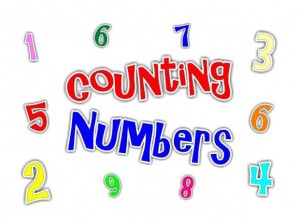We often sing, “Count your many blessings, and name them one by one. Count your many blessings and see what God has done.” I like that little song! The idea of counting to exalt God is a common theme in both the Old and the New  Testament. God instructed Abraham to count the stars. He couldn’t, but that was how many descendants God would give him. God instructed Moses to count the children of Israel as mentioned above so that they would see how great God is. Jesus instructed the fishermen to count their fish on one occasion so that they would see when man fishes he catches nothing. Jesus asked the fishermen, “how many fish have you caught?” They answer, “Zero, zilch, nada, nothing!” Then Jesus directs them on where to fish (the other side of the boat) and they catch so many that they couldn’t count them. Jesus instructed Peter to bring the fish to Him. Peter lugged the net full of fish to Jesus and then we read that there were 153 fish (See John 21:6-11 – King James). How did they know? They counted them! After counting them, they glorified God.
Testament. God instructed Abraham to count the stars. He couldn’t, but that was how many descendants God would give him. God instructed Moses to count the children of Israel as mentioned above so that they would see how great God is. Jesus instructed the fishermen to count their fish on one occasion so that they would see when man fishes he catches nothing. Jesus asked the fishermen, “how many fish have you caught?” They answer, “Zero, zilch, nada, nothing!” Then Jesus directs them on where to fish (the other side of the boat) and they catch so many that they couldn’t count them. Jesus instructed Peter to bring the fish to Him. Peter lugged the net full of fish to Jesus and then we read that there were 153 fish (See John 21:6-11 – King James). How did they know? They counted them! After counting them, they glorified God.
In churches that I’ve been affiliated with in the past it was considered unspiritual to count people who came. Many pastors still argue that it’s not about how many people come to your church but how faithful you are to God’s word. But I like to see “counting” as another way of being faithful to God’s word. There’s nothing unspiritual about “counting” the many blessings that God gives us as long as we’re counting them to praise God and not ourselves. Further, numbers matter to God especially when a number represents a beloved soul. In the lost sheep the shepherd had 100 sheep and he went looking for one that was lost. How did he know that one was lost? He counted them! The same with the woman and the 1 lost coin. It mattered to her. When people criticize those who count the number of people in their congregation, I like to ask them if they count their money. Of course they do! Then I ask, “is money more important than people?” Of course not! Every single person that worships with us at my church is important to me! People count. When numbers represent people, numbers count!
In 2 Samuel 24:10, David decided to count the people. Counting the people brought God’s judgment on them and David. He repented and said, “After David counted the people, his conscience troubled him. David said to the LORD, ‘I have committed a terrible sin by what I have done. LORD, please forgive me because I have acted very foolishly.’” It’s difficult to understand what sin David committed by counting the people. It’s especially difficult when we remember that God directed Moses to count the number of the people on several occasions (See the book of Numbers) and it was not a sin. What’s the difference? The difference between the two countings seems pretty obvious to me. When God directed Moses to count the people he was illustrating to Moses and all Israel coming out of slavery how great and mighty He was. God wanted Moses to see what God had given him. When David decided to count the people himself, he was interested in seeing how great he, himself, was. Possibly, David wanted to number the people so that he could show his detractors and other nations around them how powerful he was. This counting was not intended to exalt God, but David, the man. Whether it’s the donations from Sunday or the attendance at worship, we count so that we can praise God.